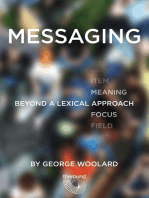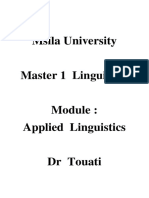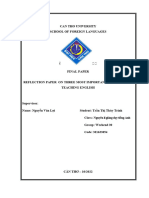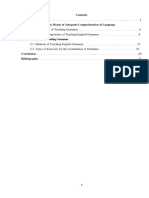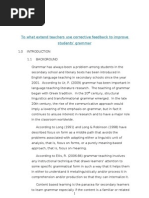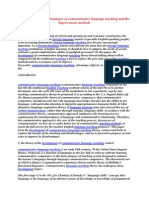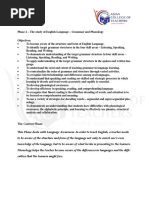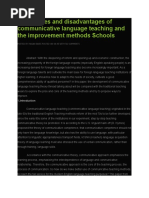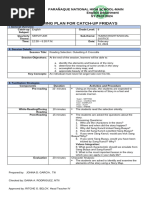0 ratings0% found this document useful (0 votes)
85 viewsEssay 4 - Pragmatics - Language Use
Essay 4 - Pragmatics - Language Use
Uploaded by
Kenny AnayThis document discusses the field of pragmatics in linguistics. It defines pragmatics as the study of language use and how meaning depends on context. Pragmatics looks at what people mean in communication rather than just the literal meaning of words. It is important for language learners to develop pragmatic competence in order to understand hidden meanings and communicate appropriately in different contexts. Teachers should help students develop this competence through activities like analyzing authentic language examples and using real-world materials like podcasts that illustrate proper language use.
Copyright:
© All Rights Reserved
Available Formats
Download as DOCX, PDF, TXT or read online from Scribd
Essay 4 - Pragmatics - Language Use
Essay 4 - Pragmatics - Language Use
Uploaded by
Kenny Anay0 ratings0% found this document useful (0 votes)
85 views3 pagesThis document discusses the field of pragmatics in linguistics. It defines pragmatics as the study of language use and how meaning depends on context. Pragmatics looks at what people mean in communication rather than just the literal meaning of words. It is important for language learners to develop pragmatic competence in order to understand hidden meanings and communicate appropriately in different contexts. Teachers should help students develop this competence through activities like analyzing authentic language examples and using real-world materials like podcasts that illustrate proper language use.
Original Description:
The Use of Pragmatics and its importance in Language.
Xavier Ateneo.
Original Title
Essay 4_Pragmatics_Language Use
Copyright
© © All Rights Reserved
Available Formats
DOCX, PDF, TXT or read online from Scribd
Share this document
Did you find this document useful?
Is this content inappropriate?
This document discusses the field of pragmatics in linguistics. It defines pragmatics as the study of language use and how meaning depends on context. Pragmatics looks at what people mean in communication rather than just the literal meaning of words. It is important for language learners to develop pragmatic competence in order to understand hidden meanings and communicate appropriately in different contexts. Teachers should help students develop this competence through activities like analyzing authentic language examples and using real-world materials like podcasts that illustrate proper language use.
Copyright:
© All Rights Reserved
Available Formats
Download as DOCX, PDF, TXT or read online from Scribd
Download as docx, pdf, or txt
0 ratings0% found this document useful (0 votes)
85 views3 pagesEssay 4 - Pragmatics - Language Use
Essay 4 - Pragmatics - Language Use
Uploaded by
Kenny AnayThis document discusses the field of pragmatics in linguistics. It defines pragmatics as the study of language use and how meaning depends on context. Pragmatics looks at what people mean in communication rather than just the literal meaning of words. It is important for language learners to develop pragmatic competence in order to understand hidden meanings and communicate appropriately in different contexts. Teachers should help students develop this competence through activities like analyzing authentic language examples and using real-world materials like podcasts that illustrate proper language use.
Copyright:
© All Rights Reserved
Available Formats
Download as DOCX, PDF, TXT or read online from Scribd
Download as docx, pdf, or txt
You are on page 1of 3
English 302
INTRODUCTION TO LINGUISTICS
KENNY H. ANAY
Master of Arts in English Language - 2
Xavier University–ATENEO DE CAGAYAN
Maria Luisa S. Saministrado, Ph.D.
English 302 Professor
Essay 4
PRAGMATICS: Language Use
When a diplomat says yes, he means ‘perhaps’;
When he says perhaps, he means ‘no’;
When he says no, he is ‘not a diplomat.’
—Voltaire (Quoted, in Spanish, in Escandell 1993.)
STANFORD Encyclopedia of Philosophy has featured the above-boxed lines. Then
it gives comments on those lines saying: The lines — also attributed to H. L. Mencken and
Carl Jung — may or may not be fair to diplomats, but are surely correct in reminding us that
more is involved in what one communicates than what one literally says; more is involved
in what one means than the standard, conventional meaning of the words one uses. The
lines may imply that ‘the words ‘yes,’ ‘perhaps,’ and ‘no’ each has a perfectly identifiable
meaning, known by every speaker of English.’ The Encylopedia, though, further
comments. It elaborates that ‘as th[e] lines illustrate, it is possible for different speakers in
different circumstances to mean different things using those words. How is this possible?
What’s the relationship among the meaning of words, what speakers mean when uttering
those words, the particular circumstances of their utterance, their intentions, their actions,
and what they manage to communicate? These are some of the questions that pragmatics
tries to answer; the sort of questions that, roughly speaking, serve to characterize the field
of pragmatics. But what really is pragmatics? And how does it work? What is its role? Is it
practical or beneficial among language speakers and language learners?
The authoritative Encylopedia Britannica defines Pragmatics on its very sense and
on its merit. It says that Pragmatics, “in linguistics and philosophy, the study of the use of
natural language in communication; more generally, the study of the relations between
languages and their users. It is sometimes defined in contrast with linguistic semantics,
which can be described as the study of the rule systems that determine the literal
meanings of linguistic expressions.”
Pragmatics is the way we convey the meaning through the communication as
plainly the description in terms of linguistic perspective. The meaning includes verbal and
non-verbal elements and it varies according to the context. The variation has also
something to do with the relationship between utterers and also [to] many other social
factors. Its dynamic growth makes English an international language that connects
people all over the world. The official website of Linguistics aptly said that “pragmatics
outlines the study of meaning in the interactional context; it looks beyond the literal
meaning of an utterance and considers how meaning is constructed as well as focusing on
implied meanings. It considers language as an instrument of interaction, what people mean
when they use language and how we communicate and understand each other.” Thomas
says that pragmatics considers: (a) the negotiation of meaning between speaker and
listener; (b) the context of the utterance; and (c) the meaning potential of an utterance.
Moreover, since English language is the world’s lingua franca, then speakers must
know many pragmatic elements in order to avoid inaccuracies and misunderstandings
during communication. Speakers must possess the so-called pragmatic competence
which will help all those who speak or learn English as a second language. Pragmatic
competence as defined by Thomas is “the ability to analyze language in a conscious
manner.” Pragmatic competence refers to the ability to comprehend, construct
utterances which are accurate and appropriate to the social and cultural circumstances
where the communication occurs. Pragmatic competence should be a leading goal for all
those who teach English as a second language. Acquiring pragmatic competence is very
much involved in the way learners are taught at school, so a simple question should be
answered. Why is pragmatics important in the field of teaching? And how should
pragmatics be taught effectively? The last part of this essay answers these questions.
Teaching pragmatics to the learners means teaching them how to use the
language appropriately. Teachers but most especially learners do need pragmatics to
understand how language is used in a specific context. Context is always considered in
this area of study. More specifically, there about three practical ways on how the
teaching of pragmatics should be carried out. Firstly, the instructor or teacher should
start with observing and analyzing the language that he and his learners use; why he uses
certain phrases in one context; how he understands hidden meanings; and when it is
appropriate to use certain phrases when talking to the manager at work. Secondly, the
instructor needs authentic resources, from podcasts, audio recording, and some other
platforms, to newspaper articles and documentary films. These materials can now be
easily accesses, most of which can be downloaded and be accessed for free. Thirdly, the
instructor needs time to find, prepare and make those resources accessible, providing
the right context for the topic introduced. The instructor should see to it that all the
materials he is using are well-suited and are aligned with the lessons. Also, the materials
to be used should answer the objectives set forth.
The success of teaching and learning the fundamental principles of Pragmatics lies
on both the teachers and the learners. The materials that are employed by the teachers
are just aid in making the understanding of the discipline practical. The application of the
principles is what matters a lot. Thus, pragmatic competence will be achieved!
Main Sources:
Bristol Language School. (2017). Language teaching: what is pragmatics and why is it
important when teaching languages? Retrieved from https://www.bls-
courses.co.uk/language-teaching-pragmatics-important-teaching-languages/.
Deda, N. (2013). The role of pragmatics in English language teaching: pragmatic
competence. ResearchGate.
Encyclopedia Britannica. (2020). Linguistics and philosophy: pragmatics. Retrieved from
https://www.britannica.com/science/pragmatics
Korta, Kepa and Perry, John (2020). Pragmatics. The Stanford Encyclopedia of Philosophy
(Spring 2020 Edition).
You might also like
- Messaging: beyond a lexical approach in ELTFrom EverandMessaging: beyond a lexical approach in ELTRating: 5 out of 5 stars5/5 (1)
- Step 5 - PragmaticsDocument7 pagesStep 5 - PragmaticsRomario García UrbinaNo ratings yet
- "Pragm Atics: Soran University Faculty of Education-School of Basic Education Department: EnglishDocument8 pages"Pragm Atics: Soran University Faculty of Education-School of Basic Education Department: EnglishEnglish TutorNo ratings yet
- "Pragm Atics: Soran University Faculty of Education-School of Basic Education Department: EnglishDocument8 pages"Pragm Atics: Soran University Faculty of Education-School of Basic Education Department: EnglishEnglish TutorNo ratings yet
- "Pragm Atics: Soran University Faculty of Education-School of Basic Education Department: EnglishDocument8 pages"Pragm Atics: Soran University Faculty of Education-School of Basic Education Department: EnglishEnglish TutorNo ratings yet
- Cours licence 3 anglaisDocument88 pagesCours licence 3 anglaisimmaculeezossNo ratings yet
- Changes in Teaching Grammar in The World and in VietnamDocument14 pagesChanges in Teaching Grammar in The World and in VietnamNguyen HalohaloNo ratings yet
- 2.first PrinciplesDocument55 pages2.first PrinciplesGabriela MedinaNo ratings yet
- The Impact of Applied Linguistics: by Kadek Agus JuniartaDocument9 pagesThe Impact of Applied Linguistics: by Kadek Agus JuniartaAgus Juniarta100% (1)
- Developing Pragmatic CompetenceDocument8 pagesDeveloping Pragmatic CompetenceSausan KeikoNo ratings yet
- Applied Linguistics Master 1 2 Msila UnivDocument64 pagesApplied Linguistics Master 1 2 Msila UnivBachir HocineNo ratings yet
- Essay PragmaticsDocument3 pagesEssay PragmaticsSASING A Lila AwaliaNo ratings yet
- Prescriptive GrammarDocument10 pagesPrescriptive GrammarMonette Rivera Villanueva100% (2)
- Topic 12 - The Concept of GrammarDocument10 pagesTopic 12 - The Concept of GrammarSara Matons100% (3)
- Module 3Document17 pagesModule 3Angelie QuinadallaNo ratings yet
- Module TSL 3108Document96 pagesModule TSL 3108Mohd Zulkhairi Abdullah100% (2)
- Defining Pragmatic CompetemceDocument8 pagesDefining Pragmatic CompetemceSausan KeikoNo ratings yet
- Communicative Approach vs. Audio-Lingual MethodDocument10 pagesCommunicative Approach vs. Audio-Lingual Methodkitkat1122334480% (5)
- Trường Đại Học Cần ThơDocument9 pagesTrường Đại Học Cần ThơHera TrinhNo ratings yet
- Methods of Teaching English GrammarDocument21 pagesMethods of Teaching English GrammarMariamNo ratings yet
- Introduction To The Pragmatics Group 1Document10 pagesIntroduction To The Pragmatics Group 1rahmatsilvia241020No ratings yet
- 5666 Assignment No 1Document17 pages5666 Assignment No 1Hafiz AhmedNo ratings yet
- Bab 2-07202244038 PDFDocument24 pagesBab 2-07202244038 PDFJohn Carlo Amido ReyesNo ratings yet
- Pragmatics - September 2021Document28 pagesPragmatics - September 2021Vân Anh Lê ThịNo ratings yet
- Introduction To Teaching PragmaticsDocument3 pagesIntroduction To Teaching PragmaticsSharon ForeroNo ratings yet
- Teaching Pragmatics Bardovi HarligDocument13 pagesTeaching Pragmatics Bardovi HarligGustavo RegesNo ratings yet
- Discourse Analysis ModuleDocument45 pagesDiscourse Analysis ModulejesuscolinaNo ratings yet
- Literature Review On Communicative Approach To Language TeachingDocument6 pagesLiterature Review On Communicative Approach To Language Teachingbujuj1tunag2No ratings yet
- Unidade 12 - Concepto de Gramática - Refelexión Sobre A Lingua e A Súa Aprendizaxe. Da Gramática Normativa Á Gramática en Función Do Emprego Da Lingua e Da ComunicaciónDocument9 pagesUnidade 12 - Concepto de Gramática - Refelexión Sobre A Lingua e A Súa Aprendizaxe. Da Gramática Normativa Á Gramática en Función Do Emprego Da Lingua e Da Comunicaciónalvanialler98No ratings yet
- Janas Annotated BibliographyDocument11 pagesJanas Annotated Bibliographyapi-295791018No ratings yet
- Topic 12Document8 pagesTopic 12Rocio GonzalezNo ratings yet
- Content-Based Learning - Corrective FeedbackDocument13 pagesContent-Based Learning - Corrective FeedbackNanthini VelaNo ratings yet
- Final TIT-Nguyen Dao Vien PhucDocument7 pagesFinal TIT-Nguyen Dao Vien PhucNguyễn Hải ThụyNo ratings yet
- Communication StrategiesDocument12 pagesCommunication StrategiesGiBiRNo ratings yet
- Teaching VocabularyDocument8 pagesTeaching VocabularyDesu AdnyaNo ratings yet
- Communicative ApproachDocument7 pagesCommunicative ApproachnandangiskandarNo ratings yet
- Advantages and Disadvantages of Communicative Language Teaching and The Improvement MethodsDocument6 pagesAdvantages and Disadvantages of Communicative Language Teaching and The Improvement MethodsRiskan Kamz100% (1)
- Discourse Analysis PaperDocument11 pagesDiscourse Analysis PaperPrince CuetoNo ratings yet
- Discourse Analysis and Language Teaching Meta 1.4 summerizing (1)Document6 pagesDiscourse Analysis and Language Teaching Meta 1.4 summerizing (1)Horacio Peraza 愛No ratings yet
- Discourse (Cook) 1. What Is Discourse?Document24 pagesDiscourse (Cook) 1. What Is Discourse?Martin SernaNo ratings yet
- Discourse (Cook) 1. What Is Discourse?Document24 pagesDiscourse (Cook) 1. What Is Discourse?Hajra QayumNo ratings yet
- Phase 2 - The Study of English Language - Grammar and PhonologyDocument66 pagesPhase 2 - The Study of English Language - Grammar and Phonologyakshita ramdasNo ratings yet
- Makalah PragmaticsDocument7 pagesMakalah PragmaticsAraNo ratings yet
- Applied and Teaching GrammarDocument10 pagesApplied and Teaching Grammarmathpix2525No ratings yet
- Teaching Vocabulary: Presentation For Methods in TeslDocument19 pagesTeaching Vocabulary: Presentation For Methods in TeslLina Li100% (2)
- CLTDocument30 pagesCLTseiNo ratings yet
- Proposal ResearchDocument19 pagesProposal ResearchHady AdjahNo ratings yet
- Advantages and Disadvantages of Communicative Language Teaching and The Improvement Methods SchoolsDocument7 pagesAdvantages and Disadvantages of Communicative Language Teaching and The Improvement Methods SchoolsFouzia Jamal GorejaNo ratings yet
- Bab 7 PDFDocument28 pagesBab 7 PDFdiangNo ratings yet
- 08.12.2022 Tarihli DerstenDocument72 pages08.12.2022 Tarihli DerstenLeynaNo ratings yet
- PROPOSALDocument25 pagesPROPOSALsaifullahNo ratings yet
- Grammar NotesDocument24 pagesGrammar NotesSuriani DaudNo ratings yet
- What Is GrammarDocument14 pagesWhat Is GrammarNico Pieter100% (1)
- PragmaticsDocument7 pagesPragmaticsLakanak BungulNo ratings yet
- Language As Discourse: Macmillan English DictionaryDocument4 pagesLanguage As Discourse: Macmillan English Dictionaryহুমায়রা জাহানNo ratings yet
- Conference PaperDocument10 pagesConference PaperQuynh NguyenNo ratings yet
- Grammar in A Communicative Approach - William Littlewood ArticleDocument15 pagesGrammar in A Communicative Approach - William Littlewood ArticleAlysson Guariento100% (3)
- Tyler Mueller Ho 2010 AILA ReviewDocument21 pagesTyler Mueller Ho 2010 AILA ReviewanthanhNo ratings yet
- Pragmatics Is Concerned With Our Understanding of Language in ContextDocument3 pagesPragmatics Is Concerned With Our Understanding of Language in ContextAngelika PerezNo ratings yet
- Task 1 Reading and Presentation C1.1Document11 pagesTask 1 Reading and Presentation C1.1mediosdadoNo ratings yet
- Lee and Marlene Canter's: Assertive DisciplineDocument15 pagesLee and Marlene Canter's: Assertive DisciplineChelsea Mujan100% (1)
- 0321944127Document46 pages0321944127Sanjay ChandwaniNo ratings yet
- Connect Plus 3 2nd TermDocument22 pagesConnect Plus 3 2nd Termsherif assalNo ratings yet
- COM/008/17 Joan Nanzala Comp 325 Artificial Intelligence Programming Assignment 1 1. T1 I. ADocument3 pagesCOM/008/17 Joan Nanzala Comp 325 Artificial Intelligence Programming Assignment 1 1. T1 I. AJoan nanzalaNo ratings yet
- Course Syllabus FormatDocument11 pagesCourse Syllabus FormatStructural DesignNo ratings yet
- EthicalQuestions PDFDocument8 pagesEthicalQuestions PDFQurat Ul AinNo ratings yet
- AI Chapter+2Document13 pagesAI Chapter+2Ammar MousaNo ratings yet
- Wellness Recovery Action Plan-2Document25 pagesWellness Recovery Action Plan-2Liz Tafoya100% (1)
- Catch-up-friday Lp Feb.23,2024 Grade 8Document1 pageCatch-up-friday Lp Feb.23,2024 Grade 8Ada Hope CumiNo ratings yet
- Narrative Report SampleDocument8 pagesNarrative Report SamplemariniabrahanNo ratings yet
- COINTELPRO - Techniques For Dilution, Misdirection and Control of An Internet ForumDocument14 pagesCOINTELPRO - Techniques For Dilution, Misdirection and Control of An Internet ForumRickyNo ratings yet
- Ourstory: Dispute System Design Technology For Stakeholder InclusionDocument116 pagesOurstory: Dispute System Design Technology For Stakeholder InclusionivyNo ratings yet
- I. O. Macari, Morpho-Syntax, Lecture 1Document25 pagesI. O. Macari, Morpho-Syntax, Lecture 1Bianca CiuteaNo ratings yet
- Qdoc - Tips - General Math DLL For Shs q1 Week 02 1Document2 pagesQdoc - Tips - General Math DLL For Shs q1 Week 02 1Joemard FranciscoNo ratings yet
- Descriptive Essay Theory & SampleDocument3 pagesDescriptive Essay Theory & SampleMaría De Los Ángeles Guillén VivancosNo ratings yet
- Sri AmmaBhagavan S DAILY WEEKLY TEACHINGS (AJ)Document34 pagesSri AmmaBhagavan S DAILY WEEKLY TEACHINGS (AJ)Jan KroutilNo ratings yet
- INQUIRIES, INVESTIGATIONS AND IMMERSIONDocument4 pagesINQUIRIES, INVESTIGATIONS AND IMMERSIONNoel GuadayoNo ratings yet
- SAS Session 6 Research 2Document5 pagesSAS Session 6 Research 2Angel Grace Palenso QuimzonNo ratings yet
- Communicative Language Teaching Lesson Plan - Alexandra - FloresDocument2 pagesCommunicative Language Teaching Lesson Plan - Alexandra - FloresAlexandra FloresNo ratings yet
- FS1 and FS2 ObservationDocument17 pagesFS1 and FS2 ObservationArline Hinampas BSED-2204FNo ratings yet
- Reading Grade KDocument34 pagesReading Grade KSara Lahouassa100% (1)
- Difference BETWEEN GUIDANCE AND COUNSELINGDocument13 pagesDifference BETWEEN GUIDANCE AND COUNSELINGsrimalathi100% (2)
- The Gentleman's Guide To Forum Spies (Spooks)Document12 pagesThe Gentleman's Guide To Forum Spies (Spooks)mancubNo ratings yet
- Book Review: David HURON. Voice Leading: The Science Behind A Musical ArtDocument18 pagesBook Review: David HURON. Voice Leading: The Science Behind A Musical ArtDavid Daniel DNo ratings yet
- C DacDocument15 pagesC Dacdipak kumarNo ratings yet
- Phonological Awareness and Phonemic AwarenessDocument1 pagePhonological Awareness and Phonemic Awarenessblue_cristal85No ratings yet
- Leadership Observation and Interview Assignment 2: LecturerDocument18 pagesLeadership Observation and Interview Assignment 2: Lecturerphuc buiNo ratings yet
- Unit-4 Topic of The Unit: PerceptionDocument55 pagesUnit-4 Topic of The Unit: Perceptionरोशन सिग्देलNo ratings yet
- Powerful Mind Power Techniques Available at Your FingertipsDocument1 pagePowerful Mind Power Techniques Available at Your FingertipsJ_BechampOmpregaNo ratings yet
- Stages: Three-Stage Process of SHRMDocument4 pagesStages: Three-Stage Process of SHRMIndranil SarkarNo ratings yet
